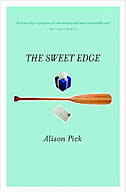The Sweet Edge, by Alison Pick

Among my bundle of books to take to England (which turned out to be woefully inadequate as I'm such a fast reader) I included two recent novels by Newfoundland authors, one of which was Alison Pick's The Sweet Edge. This is a short and spare novel about a twentysomething couple, Ellen and Adam, whose relationship has gone awry after three years together. They spend the summer apart, Ellen working at a boring job in a city she doesn't like and Adam taking a long-dreamed-of canoe trip alone into the Canadian North.
That summary pretty much tells you what's annoying about these characters, neither of whom I liked much at the beginning of the novel. Adam is the poster boy for Self-Absorbed Jerks Afraid of Committment, while Ellen is typical of the kind of woman I meet so often in novels and so rarely in real life: passive, indecisive, a bystander in her own life.
Things change during the novel, however. Adam's trip up North is the classic man-against-the-wilderness-finding-yourself journey, but there are twists he hasn't forseen: the trip forces him to confront his own weakness and his need for other people. Meanwhile, Ellen goes on her own journey of self-discovery without ever leaving Toronto, though she does travel around it quite a bit. Her voyage is made not in solitude but in community; the group of new friends who help Ellen "find herself" are among the most engaging characters in the book. In the end, then, the book accords well with my own recent musings about "finding yourself" on a journey: community is as important as solitude in self-discovery, if not more so.
Starting out by disliking the major characters is not usually a good sign for a book but by the end of The Sweet Edge I found myself caring about Ellen and Adam in spite of their flaws. I was interested to see how Pick would end the novel and I wasn't disappointed (though a bit frustrated by a detail that, in a very postmodern way, is left hanging at the end).
The language is one of the delights of The Sweet Edge. I'm not always keen on novels by poets (Pick is best-known as a poet and recent winner of the prestigious CBC literary award for poetry) because too often the language takes centre stage, leaving plot and characters to fend for themselves. Here, however, Pick's subtly elegant prose is always used in the service of the story, so that you never forget you're reading a novel -- a very well-written novel, but not one that screams, "Look at my prose! How lovely it is!" Rather, we're drawn to look through the clear window of Pick's prose into the lives of two people who are flawed and fallible, but who are also able to change.

0 Comments:
Post a Comment
<< Home